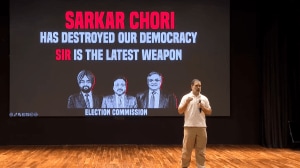Ritu Sarin is Executive Editor (News and Investigations) at The Indian Express group. Her areas of specialisation include internal security, money laundering and corruption. Sarin is one of India’s most renowned reporters and has a career in journalism of over four decades. She is a member of the International Consortium of Investigative Journalists (ICIJ) since 1999 and since early 2023, a member of its Board of Directors. She has also been a founder member of the ICIJ Network Committee (INC). She has, to begin with, alone, and later led teams which have worked on ICIJ’s Offshore Leaks, Swiss Leaks, the Pulitzer Prize winning Panama Papers, Paradise Papers, Implant Files, Fincen Files, Pandora Papers, the Uber Files and Deforestation Inc. She has conducted investigative journalism workshops and addressed investigative journalism conferences with a specialisation on collaborative journalism in several countries. ... Read More
Please switch off your cellphone if you are planning to break the law
NEW DELHI, JANUARY 17: *Tu mere film ko finance kar (you finance my film)'' is what gangster Chhota Shakeel is said to have told diamond m...

NEW DELHI, JANUARY 17:
*Tu mere film ko finance kar (you finance my film)” is what gangster Chhota Shakeel is said to have told diamond merchant Bharat Shah from Karachi on the cellphone and the Mumbai Police moved in.
* Or take the case of conman Romesh Sharma who was arrested two years ago when he was allegedly plotting a murder with Shakeel, who was then holed up in Dubai. Sharma was careful to take calls on a secret cellphone but his luck ran out. “Call me on triple one” is all he said and the Delhi police got both the cellphone number and Sharma.
It WAS in mid-1996 that the Centre asked cellphone companies to import monitoring equipment — part of the contract — and today the police and intelligence officials admit it has been a boon. Earlier the facility was available only in the metros, but now the companies in the states too have imported the electronic monitoring rack (costing around Rs 1.8 crore each) through which a maximum of 180 cellphone calls can be tracked simultaneously.
The expenditure on the equipment as well as the software (around Rs 10 lakh annually) is being borne by the companies as of now. The dedicated lease lines which were to connect the service providers to the headquarters of the intelligence and police agencies have still not been laid, making cellphone monitoring a cumbersome and time-consuming process.
“Yes, it is a big hassle for us,” admits T V Ramachandran, Director General of the Cellular Operators Association of India, “but we have been co-operating and allowing monitoring since it serves a national cause.” He explains that almost in all cases the companies demand a written authorisation from the investigating agency as laid down by the Supreme Court in its December 18, 1996 judgment. The courts now demand it during the trial.
Crucial to this operation is the cell-ID. In Delhi, for instance, cellphone transmission is divided into 400-odd zones. The cell-IDs tell investigators the rough location of their suspect.
According to sleuths, while initially the “listener” used to station himself in the office of the cellphone company, these days a parallel line is connected to a land line or a cellphone. The sleuths simply listen in and record the conversation on a register or tape recorder. Says Vivek Gogia, Additional Deputy Commissioner of Police: “Monitoring cellphones gives us real time information. While informers tell us about events in the past or future, this provides leads even as the events are taking place.”
The match-fixing scam, for instance, was discovered by Delhi Police while monitoring extortion calls being made from Dubai to Onkar Singh Kanwar, proprietor of Apollo Tyres. The cellphones of Delhi-based bookies Sanjeev Chawla and Rajesh Kalra were also tapped. Once the case was handed over to the CBI, phones of scores of suspected bookies were tapped all over the country. And on more than one number, instead of a betting syndicate, the CBI uncovered flourishing call-girl rackets!
Similarly, sleuths in the Directorate of Revenue Intelligence (DRI) recall how they smashed a module of Pakistan’s ISI days before it was planning explosions at the railway station while tapping the phones of a drug syndicate. The numbers were handed over to Delhi Police, and it was the sound of barking that led them to the gang’s hideout.
Another big breakthrough was in the case of hijacking of IC-814. Senior CBI officials recall how Mumbai Police had got the cellphone number of Abdul Latif, the hijackers’ pointman in Mumbai, and recorded his conversations with Abdul Rauf in Karachi. When the police finally raided his apartment in the Jogeshwari area, it was the twitter of birds that guided them.
The process can be time-consuming. H S Cheema, Assistant Commissioner of Police, says they had to track the cellphone of alleged murderer Hari Om for an entire month. It was finally a cryptic message he gave to a female courier that did him in. “Ticket lekar andar jao” he told the accomplice, whose cell-ID was in NOIDA. The only place where a ticket could be procured at that time in the vicinity was the Kalindi Kunj park. Hari Om and the woman were trapped.



- 01
- 02
- 03
- 04
- 05





























